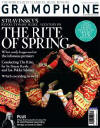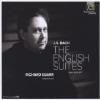Texte paru dans: / Appeared in:
*

GRAMOPHONE (03/2013)
Pour s'abonner /
Subscription information
Harmonia Mundi
HMU907591.92

0093046759124 (ID289)
Reviewer: Philip Kennicott
Purcell, Couperin and now Bach from Egarr’s harpsichord
After robust, earthy Purcell and delicately characterful Louis Couperin, Richard Egarr’s Bach English Suites are carefully controlled, polished, thoughtful and reserved. The effect is rather like a thin coat of varnish over a picture in which every detail of light and shadow has been finely balanced. Compared with earlier Egarr recordings, these discs may suggest a downsizing of his keyboard personality in favour of readings that serve Bach and the listener without any intrusion of idiosyncrasy.
Egarr’s tempi can be recommended as canonical to students of this music. His preludes unfold with excitement and virtuosity but never feel rushed or forced; his allemandes walk with a stately but never pompous or languorous pace; his courantes have a wholesome vitality but never run away in a frenzy; and his sarabandes are spacious without succumbing to morbid introspection. Ornamentation is generally light, precise and unfussy, if sometimes, as in the too frequent addition of simple passing tones in several repeats, not altogether imaginative.
So what’s going on here? Egarr’s short booklet essay notes the somewhat orphaned character of the English Suites within the larger Bach keyboard oeuvre: they suffer in comparison to the ‘amazing musical megaliths’ of the Goldberg Variations, the Partitas and The Art of Fugue. But he likes them for their pure keyboard delight and inexhaustible imagination.
And yet, in his proper, meticulous and thoroughly attentive readings, he seems to be making a case for their inclusion among the megaliths. Compare Egarr to other players, Christine Jaccottet (Denon), say, and you hear a determined inclination to self-control. Gustav Leonhardt’s readings of the same suites (Sony, 10/97) are more magisterial, quirky and wild than this one-time student.
But as Egarr’s traversal of all six suites unfolds, it becomes increasingly clear that his approach isn’t about self denial or lack of ideas. Rather, it is part of a slowly cumulative reading that builds and climaxes in the Sixth Suite, with its sprawling, organ-like Prelude and dignified yet passionate Sarabande. Egarr’s expressive powers, his careful use of small agogic accents, his clarity of line, all come together in something broader and grander, yet essentially connected to everything that has come before.
The parameters of expression for any one suite, or any one movement within a suite, have been adjusted to fit within a larger schematic sense of the English Suites, which taken together approach Mahlerian length. It would be a mistake to recommend playing the last suite first. But for listeners struggling to find what they most admire in Egarr’s playing in the somewhat muted earlier movements, the advice is simple: hold on, it will all make sense.
Cliquez l'un ou l'autre
bouton pour découvrir bien d'autres critiques de CD
Click either button for many other reviews


